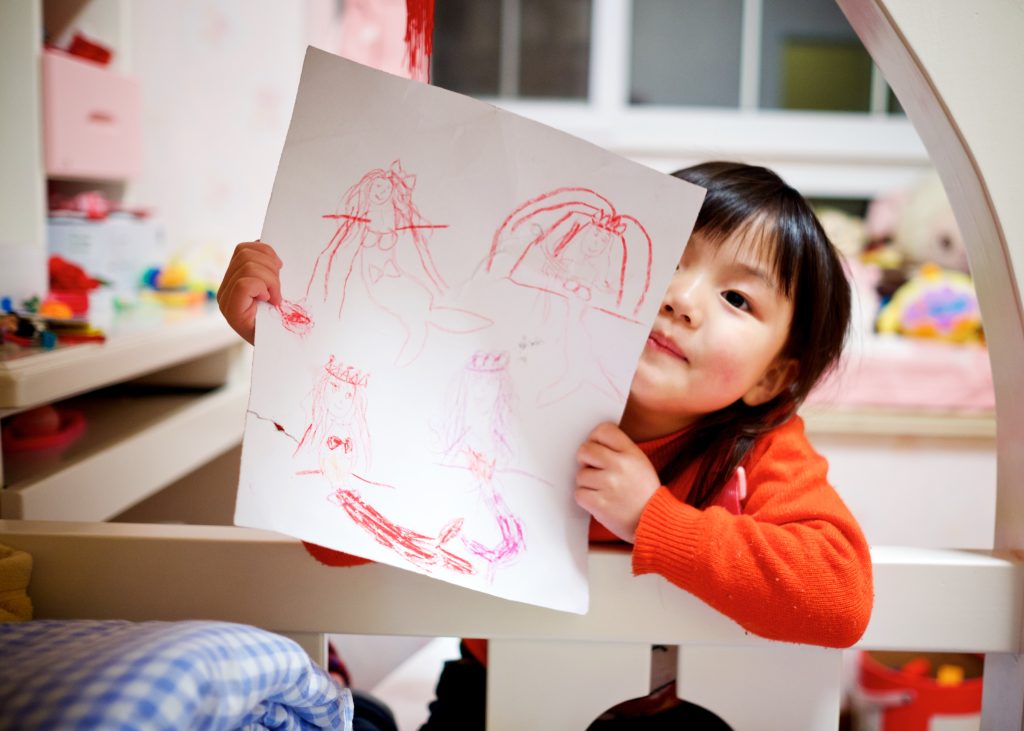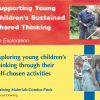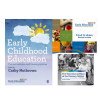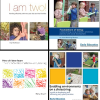Letter to the next Prime Minister
The letter below sets out our key asks for the next government.
by Dr Jo Albin-Clark, Edge Hill University and Dr Nathan Archer, Leeds Beckett University
Being involved in education in England involves navigating an intense policy landscape where accountability is entangled with surveillance and performativity (Spencer Woodley, 2014; Kilderry, 2015). Ofsted, the regulatory accountability mechanism in England, has seen heightened scrutiny recently after the tragic death of a headteacher. Consequently there have been impassioned reactions, with calls for reference to Ofsted to be removed, inspections to be halted and ultimately whole-scale reform.
Certainly, in the work of (early) education there are accountabilities to multiple stakeholders. Few educators would question their accountability to children and parents, but the surveillance and high stakes scrutiny by regulators is something entirely different. Recent days have seen a wave of stories in the press and on social media highlighting the stress, anxiety and health ramifications of Ofsted inspections. Accountability brings an emotional vulnerability as the boundaries between the personal and professional are porous, especially when it comes to judgements being boiled down to one word only. Words and images that appear through multiple documentation are powerful and have both effect and affect (Albin-Clark, 2021). There are further questions too about how the processes bound up with inspection processes (deep dives, mock inspections, data generation, staff monitoring observations) impact upon young children themselves, along with their families and educators.
According to Colman (2021), Ofsted foregrounds a hyper-enactment of policy that prioritises compliance at the expense of school leaders’ ability to address the important social context of the school. Professional unions have questioned the relationship between inspection and educational standards in English schools (Bousted, 2020). It would seem we have reached a crisis point in asking questions about who exactly schools and early childhood and care settings are in service to as they walk a tightrope of conflicting accountabilities.
One key factor is how the educational system in England foregrounds an audit culture where settings and schools are expected to have an “Ofsted story” ready that details a narrative of progress for children (Bradbury and Roberts-Holmes, 2017). Consequently, Ofsted acts as a constant form of surveillance which means their function has extended way beyond an inspection body, and instead manufactures a “mandate for defining ‘quality’ and ‘good’ practice.” (Wood, 2019:784). A consequence of this is a preoccupation with metrics, datafication and measurement (Roberts-Holmes et al, 2023). Children then become datafied even before they even reach compulsory schooling (Bradbury, 2019). Thus, regulators rely on a centralised and technical prescription of quality. Yet in reality we exist in a post pandemic era where settings and schools are supporting families and their staff through an extraordinarily demanding period of hardship and vulnerability. Yet metrics cannot measure that kind of emotional labour, but it is central to the relational work of early education and care. But as Moss writes: “‘Quality’ is neither neutral nor self-evident but saturated with values and assumptions…. for example, the value given to certainty and mastery, linearity and predictability, objectivity and universality.” (2016:9-10)
It is all too evident that audit cultures have consequences. The intensification of external accountability results in a diminished agency of educators through “reduced autonomy as a result of the regulatory gaze” (Osgood, 2010:124) with identities increasingly shaped by regulation. A notable consequence of such accountability and surveillance as experienced by participants in numerous studies (Sloan, 2022; Oosterhoff et al, 2020) were feelings of not being trusted along with an erosion of autonomy. Such accountability via surveillance inevitably impacts upon the professional identities of educators. As Roberts-Holmes and Moss write:
Professional identity is corroded by this performative culture, deprofessionalising practitioners and steering them away from the pedagogical values and principles that may have brought them into the work in the first place or which they learnt during their education. …the teacher’s subjectivity becomes “made up” by performance data…
(2021:120)
As a result, educators find themselves negotiating personal pathways through structural constraints (Jeffrey and Woods, 1998).
In our recent research enquiries, we have wondered about how accountability and policy mechanisms cause tensions for educators (Archer and Albin-Clark, 2022, Archer 2022, Albin-Clark, 2020). We take a close interest in educators who find and develop their autonomy and agency through resistance and subversion practices. In our latest paper we researched how practitioners found ways to promote children’s entitlement and right to play through pushing back on accountability narratives and asserting a resistance to narrow definitions of learning (Albin-Clark and Archer, forthcoming). We found that what mattered was the capacity to tell stories of children’s play as a way of foregrounding deeply held pedagogical values.
Recent events with Ofsted suggest this resistance practice is gaining momentum (see also Eastleigh pre-school shuts over Ofsted inspection row – BBC News). Beyond resistance, there is research on educator activism. Sachs proposes a renewed focus on teacher inquiry and research literacy as features of an activist identity, in order to counter the domination of standards-based accountability. Sachs suggests:
…a new approach [which] requires that teachers collectively and individually address those in power to make it clear that a top-down approach is simply not working, nor, in principle, is it likely to work.
(2016:414)
So, questions remain about how educators navigate accountability tensions and find ways of developing advocacy and efficacy. It seems at the moment there is an opportunity to amplify what is unique and distinct about early education and care and therefore what really matters for our youngest children and those who work within the field. This kind of debate can shape any calls to review the role and process of inspection processes. We have found these questions helpful:
Albin-Clark, J. (2020). ‘I felt uncomfortable because I know what it can be’: The emotional geographies and implicit activisms of reflexive practices for early childhood teachers. Contemporary Issues in Early Childhood, 21(1), pp.20-32.
Albin-Clark, J. (2021). What is documentation doing? Early childhood education teachers shifting from and between the meanings and actions of documentation practices. Contemporary Issues in Early Childhood, 22(2), pp.140-155.
Albin-Clark, J. and Archer, N (forthcoming) Playing social justice: How do early childhood teachers enact the right to play through resistance and subversion? PRISM: Casting New Light on Learning, Theory and Practice.
Archer, N. and Albin-Clark, J. (2022), July. Telling Stories That Need Telling: A Dialogue on Resistance in Early Childhood Education. In FORUM (Vol. 64, No. 2, pp. 21-29). Lawrence and Wishart.
Archer, N. (2022.) ‘I have this subversive curriculum underneath’: Narratives of micro resistance in early childhood education. Journal of Early Childhood Research, 20(3), pp.431-445.
Bousted, M. (2020). October. Ofsted: A problem in search of a solution. In Forum (Vol. 62, No. 3, pp. 433-443). Lawrence and Wishart.
Bradbury, A. (2019). Datafied at four: the role of data in the ‘schoolification’ of early childhood education in England. Learning, Media and Technology, 44(1), pp. 7-21.
Bradbury, A. and Roberts-Holmes, G. (2017). Creating an Ofsted story: the role of early years assessment data in schools’ narratives of progress, British Journal of Sociology of Education, 38:7, 943-955, DOI: 10.1080/01425692.2016.1202748
Colman, A. (2021). School leadership, school inspection and the micropolitics of compliance and resistance: Examining the hyper-enactment of policy in an area of deprivation. Educational Management Administration & Leadership, 49(2), pp.268-283.
Kilderry, A. (2015). The intensification of performativity in early childhood education, Journal of Curriculum Studies, 47:5, 633-652, DOI: 10.1080/00220272.2015.1052850
Moss, P. (2016). Why can’t we get beyond quality? Contemporary Issues in Early Childhood, 17(1), 8–15. https://doi.org/10.1177/1463949115627895
Oosterhoff, A., Oenema-Mostert, I. and Minnaert, A. (2020). Constrained or sustained by demands? Perceptions of professional autonomy in early childhood education. Contemporary Issues in Early Childhood, 21(2), pp.138-152.
Osgood, J. (2010). Reconstructing professionalism in ECEC: The case for the ‘critically reflective emotional professional’. Early Years, 30(2), pp.119-133.
Roberts‐Holmes, G. and Bradbury, A. (2016). Governance, accountability and the datafication of early years education in England. British Educational Research Journal, 42(4), pp.600-613.
Roberts-Holmes, G. and Moss, P. (2021). Neoliberalism and early childhood education: Markets, imaginaries and governance. Routledge.
Roberts-Holmes, G., Paananen, M., Siippainen, A., Albin-Clark, J., Archer, N. and Chung, J. (2023) Metric Fixation and The Datafication of Early Childhood Education and Care Contemporary Issues in Early Childhood:
Sloan, K. (2022). Scarcity and surveillance in early childhood education. Contemporary Issues in Early Childhood. https://doi.org/10.1177/14639491221128884
Spencer-Woodley, L., (2014). Accountability: Tensions and challenges. In: Z. Kingdon and J. Gourd, eds. Early Years Policy: The Impact on Practice. Abingdon: Routledge, pp. 33–55.
Wood, E. (2019). Unbalanced and unbalancing acts in the Early Years Foundation Stage: a critical discourse analysis of policy-led evidence on teaching and play from the office for standards in education in England (Ofsted). Education 3-13, 47(7), pp.784-795.

The letter below sets out our key asks for the next government.
On 10 June, Labour announced their plans for “over three thousand new nursery classes across England to open up access to childcare hours for families”,
The Lib Dems have published their manifesto, including commitments to incorporate the UN Convention on the Rights of the Child into UK law and to
Today, Friday 17 May, the Early Education and Childcare Coalition (EECC) has launched its new manifesto, with proposals to rescue and reform England’s early education
A new campaign to boost recruitment to the early years sector in England is being launched today by the government. The government press release says:
Early Education Associate, Debi Keyte-Hartland reflects on a recent commission by Balcarras Teaching School Hub In Gloucestershire to deliver a four-day course on Sustained Shared
Guest blog by Frances Giampapa and Claire Lee Introduction A wealth of evidence demonstrates the fundamental role played by early years (EY) education in shaping
by Katherine Gulliver Introduction Early Education was recently asked to review the special educational needs and/or disabilities (SEND) provision in the early years within one
For many of us, the path we’ve taken in our careers can often be traced back to the passions and talents of our childhood and
Clare Devlin, Early Education Associate What aspects of physical development should we focus on within the Early Years Foundation Stage (EYFS) and other early years
In a speech today, Kier Starmer will set out Labour’s plans to expand opportunity via five “missions” including “Early years reform – to boost child development with an
By Debi Keyte-Hartland, Early Education Associate This article is based on one included in the Early Education Journal no 100. To access the full article
The Department for Education (DfE) is currently consulting on proposals to amend the Early Years Foundation Stage. They propose relaxing the requirements around the minimum
In this article, Kate Irvine from Bristol Early Years discusses the impact of practitioners engaging in a sustained process of CPD through cluster groups and
The Department for Education (DfE) have published their response to the consultation on potential changes to staff:child ratios. The consultation received responses from nearly 10,000
by Kayla Halls, Early Years Research Fellow at Middlesex University & Mona Sakr, Senior Lecturer in Early Childhood at Middlesex University’ Leaders in the early
Today, teachers from the National Education Union are striking, including many working in nursery and reception classes. In the last week, the Department for Education
by Amanda Ince and Liz Bullough, UCL Institute of Education “I want to be an inspiring leader who can inspire my colleagues in my setting
Ofsted’s latest annual review highlights the impact of recruitment and retention challenges and finds a link between inspection outcomes and the proportion of graduates in
What are “Fundamental British Values”? by Vicky Hutchin The so-called “Fundamental British Values” form a part of the Prevent Duty, introduced in 2015 and last
The open letter below was sent to Ofsted in November 2023. Download Ofsted’s response We the undersigned are writing to you about the recently published
The Ofsted early years curriculum review Best start in life part 1: setting the scene, has just been published, which they describe as being part of
by Clarissa Frigerio Why are there so few men teaching in the early years? I have worked in the profession for almost 9 years, and
It could be argued that teachers who move into teaching reception for the first time, face the same challenges as the children themselves as they start in reception.
Early childhood education today has been influenced by key figures such as Froebel, Montessori, Isaacs and MacMillan. Much recent research has supported their ideas although
The tenth early years minister in ten years, Kelly Tolhurst, is now in post. It’s good news that early years is part of a Minister
External Vacancies Internal Vacancies To advertise here, contact office@early-education.org.uk Organisation and multisite members may advertise vacancies for free as part of the membership package. Download Job advertisement
Sustained shared thinking: An episode in which two or more individuals “work together” in an intellectual way to solve a problem, clarify a concept, evaluate
Early years pedagogy is the theory that informs the practice of teaching children in the early years. The pedagogical research has been carried out by
by Cathy Gunning What is reflective practice? Reading a book by Donald Schon early on in my career as a teacher opened my eyes to
The Early Career Framework has been designed by the Department for Education in England to support newly qualified teachers in England with a structured package of support
The following extracts from past early years teaching newsletters have a feature which supports your team dialogue around pedagogy and practice dilemmas and reflective practice.
Last updated Spring 2018. The preschools of the Reggio Emilia in Northern Italy inspire us with their pedagogy and practice in giving children rich encounters
In most cases, sound early years principles and practices are already in place in settings. The EYPP funding allows settings to review and refine what
Who was Friedrich Froebel (1782-1852) Born on 21 April 1782 Friedrich Froebel was a German educator who invented the kindergarten. He believed that “play is
This article by Early Education Associate Anni McTavish explores the term “cultural capital”, and what it might mean for early years practitioners and their settings.
Welcome to the e-book Child-Centred Competences for Early Childhood Education and Care. The book brings together four years of research undertaken by early childhood academics
Raymond Williams maintained, after years of examining constructs of culture and society that “Culture is one of the two or three most complicated words in






Early Education
2 Victoria Square
St Albans
AL1 3TF
T: 01727 884925
E: office@early-education.org.uk